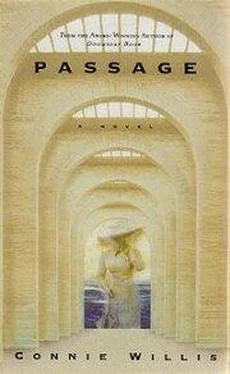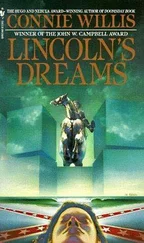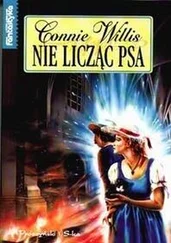“No,” Joanna said. “It never occurred to me.” She had always assumed they were experiencing the NDE in what Richard called normal time. Some of them had talked about moving rapidly through the tunnel, and she had asked what they meant by “rapidly” to see if they were attempting to describe some sort of speeded-up sense of time, but she had never thought to ask how long they’d stared at the light or how long the life review had taken. She’d simply assumed that the duration of the NDEs matched the length of the activities they’d described. And it had never occurred to her to compare their subjective experience with the length of time they’d been clinically dead.
“What about at the end of your NDE?” Richard asked. “Was there time dilation as you were going back down the tunnel?”
“I didn’t go back down the tunnel,” she said. “I started to, and then all of a sudden I was back in the lab. It wasn’t like the other times I’ve returned. It was much more… abrupt,” she said, trying to think of a way to describe it, but Richard was back on the subject of time dilation.
“You didn’t experience time dilation the other times either?”
“No.” I need to ask Mrs. Woollam if the duration of her NDEs varies, she thought. And Maisie. Maisie’d said she’d only seen fog, and Joanna had assumed from that that her NDE had only lasted a few seconds. Now she wondered.
“Look at this,” Richard said, staring at the console screen. “The duration of Amelia Tanaka’s NDE-state varies as much as four minutes.”
Tish went over to stand next to him and look interestedly at the screens. “Maybe it’s like time in a dream. You can dream whole days between the time your alarm goes off and when you wake up a few seconds later,” she said. “I had a dream like that the other morning. I dreamed I went to Happy Hour at the Rio Grande and then up skiing at Breckenridge and it all happened in the two seconds between the guy on the radio saying, ‘It’s six o’clock,’ and, ‘More snow predicted for the Rocky Mountain area today,’ ” but Richard didn’t hear her. He went on typing, totally absorbed.
“Can I get dressed now?” Joanna asked, but he didn’t hear that either. “I’m getting dressed now,” she said, slid off the examining table, and went into the dressing room.
Richard was still at the console, staring intently at the images, when she came out. Tish was putting on her coat. “I’m leaving,” she said disgustedly. “Not that he’d notice. If you can get through to him, tell him if he wants me here before two tomorrow to give me a call.” She looked wistfully at him. “At least I know it’s not me. He doesn’t know you exist either.” Tish pulled on her coat. “There are more things in life—”
Than are dreamt of in your philosophy, Horatio, Joanna thought.
“—than just work, you know,” Tish finished. She pulled on her gloves. “Happy Hour’s at Rimaldi’s tonight, if you want to ditch Doctor-All-Work-and-No-Play.”
“Thanks,” Joanna said, smiling, “but I’ve got to get my NDE recorded while it’s still fresh in my mind.”
Tish shrugged. “There’d better be more things in death than work,” she said, zipping up her coat, “or I’m not going. ’Bye, Dr. Wright,” she called gaily on her way out.
Richard didn’t even look up. “Mr. Sage’s NDEs vary by two minutes and fifteen seconds,” he said. “I’d been assuming there was a direct correlation between real time and the subjective time of the NDE, but if there’s not…”
If there’s not, then maybe brain death doesn’t occur in four to six minutes, Joanna thought. Maybe it’s shorter. Or longer.
“Can you check for references to time dilation in your interviews?” Richard asked.
“Yes,” she said, but there aren’t any, she thought. If time had seemed to slow down or speed up, they wouldn’t have said it wasn’t a dream, that it felt real.
And it did feel real, she thought, going back to her office to record her account. It had seemed like it was happening in real time, in a real place. Which you’re no closer to identifying than you were.
And no closer to identifying the sound, which meant it only took her a few minutes to record her entire NDE. She described the voices and what they’d said, her turning around, starting back—
I wonder if that was what ended the NDE, she thought, and started through the transcripts, looking specifically at the endings. A number of them described their return as “abrupt” or “sudden.” “I felt like I was being pulled back to my body,” Ms. Ankrum had said, and Mr. Zamora had described the end of his NDE as “like somebody picked me up by the scruff of the neck and threw me out.”
Neither of them had mentioned the tunnel as being the way back, but Ms. Irwin had said, “Jesus told me, ‘Your time is not yet fulfilled,’ and I found myself in the tunnel again,” and nearly a dozen had said they’d reentered the tunnel. “The spirit pointed to the light and said, ‘Dost thee choose death?’ and then he pointed at the tunnel and said, ‘Or dost thee choose life? Choose thee well.’ ” Why does every spirit and religious figure and dead relative speak in that stilted, quasi-religious manner, a cross between the Old Testament and Obi-Wan Kenobi? Joanna thought.
She made a list of the references to show Richard, wishing she’d gone to Happy Hour, where there would at least be nachos or something to eat. She hadn’t had any lunch because of the session. She opened her desk drawer, looking for a stray candy bar or an apple, but all she found was half a stick of gum so old it broke when she pulled the foil off.
She should have ransacked Richard’s lab coat pockets before she left the lab. He’d never have noticed, she thought, and had the feeling again of almost, almost knowing where the tunnel was. She sat perfectly still, trying to hold on to the feeling, but it was already gone. What had triggered it? Something about stealing food from Richard’s lab coat supply. Or could it have been the gum? And what famous place had she never been to that featured wooden floors, blankets, and ancient gum?
It’s hunger, she thought. Starving people are prone to mirages, aren’t they? But Richard had told her to tell him if the feeling recurred, so she went up to the lab and reported it to him.
“You don’t have to steal, you know,” he said, producing a package of Cheetos, a pear, and a bottle of milk from his pockets. “You can just ask.”
“It wasn’t the food,” she said, opening the milk. “It was the idea that you were so intent on what you were doing that you wouldn’t know I was taking it.”
“Do you have the feeling now?”
“No.”
“I think it might be the temporal lobe.” He went over to the console. “I’ve been looking at your scans. Tell me again about the sound. You heard it, but you can’t identify it?”
She nodded, biting into the pear.
“I think that may be because it’s not occurring. Look at this,” he said, pointing to a blue area on the scan. “There’s no activity in the auditory cortex. I’d been assuming there was an actual auditory stimulus from within the brain, but I think it may be a temporal-lobe stimulus instead.”
“Which means what?”
“Which means you can’t identify the sound because you’re not hearing it. You’re only experiencing a sensation of having heard something, with no sound to attach it to.”
But I did hear it, Joanna thought.
“Temporal-lobe stimulation would explain why there’s so much variation in description. Patients have a feeling they heard a sound, so they simply confabulate one out of whatever sound they heard last.”
Like the ringing of the code alarm, Joanna thought, or the hum of the heart monitor going flatline.
Читать дальше












